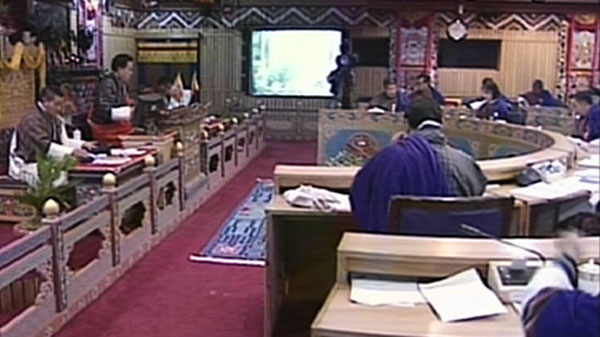 The National Council forwarded the Goods and Services Tax (GST) Bill of Bhutan 2020 to the National Assembly with two recommendations. The House recommends the government to withdraw the Bill and to make a clear distinction between Money Bill and Financial Bill.
The National Council forwarded the Goods and Services Tax (GST) Bill of Bhutan 2020 to the National Assembly with two recommendations. The House recommends the government to withdraw the Bill and to make a clear distinction between Money Bill and Financial Bill.
The Good Governance Committee of the House says the recommendation to withdraw the GST Bill is in the interest of saving the parliament from willfully violating the Public Finance (Amendment) Act 2012 and to provide government enough time to ready necessary infrastructural facilities for a smooth transition to GST system.
The Good Governance Committee of the House of Review raised concerns on the legality of the commencement date of GST Bill 2020. The government proposed to implement the Bill in two phases- chapters 7,8,9 and 10 to be enforced from 1st July 2021 and to enforce chapters 1 to 6 and 11 to 30 from the day of enacting the Bill as Law.
“It is unprecedented for one Bill to have two dates of commencement. Secondly, as per section 46B of Public Finance Amendment Act 2012, imposition or increase of any tax or abolition, reduction or remission of any existing tax once passed as law by the parliament shall be applied retroactively from the date it was initially tabled in the National Assembly. The GST Bill of Bhutan 2020 is already endorsed as Money Bill by the National Assembly, and the definition of Money Bill as per section 46A of Public Finance Amendment Act 2012 is a Bill which contains only provisions dealing with imposition or increase of any tax or abolition, reduction or remission of any existing tax. The commencement date should, therefore, be in accordance with section 46B of Public Finance Amendment Act 2012,” said Lhatu, the Chairperson of Good Governance Committee.
Some members also said that the GST Bill 2020 is not worth a money bill and that there is a need to have a clear distinction between Money Bill and Financial Bill.
“Looking at the Committee’s observation, I think the committee felt that the GST Bill is not worth a Money Bill. Section 46 of the Public Finance Amendment Act 2012 says Money Bills or Financial Bill. So there is no clear distinction between the two Bills. The Act also grants the Speaker the authority to decide if the Bill falls into the category of Money Bill or not. So I would recommend either the government or the National Assembly to propose the amendment of the Public Finance Act 2012,” recommended Pema Dakpa, the Member of Parliament (MP) of Zhemgang.
All the members present supported both the recommendations.
“The Bill is ready for implementation only by 2021. The government is not yet ready in terms of infrastructure and have not created awareness and is also in the process of consultation. So I totally agree with the committee’s recommendation to withdraw the Bill,” said Dorji Khandu, the Gasa MP.
“The government’s proposal to implement some chapters of the Bill only in July 2021 is against the Public Finance Amendment Act 2012. I do not think we can adopt a Bill that is not ready for implementation,” added Ugyen Namgay, the Haa MP.
“As proposed by the MPs from Zhemgang and Haa, there is a need to amend the Public Finance Amendment Act 2012. The Act mentions two bills- Money Bill and Financial Bill. But not all Financial Bills are Money Bill. But all Money Bills are Financial Bill. From what I understood, the Speaker has the authority to decide what defines a Money Bill or Financial Bill. So I am concerned that if the Speaker has the authority to decide that also raises concerns.,” shared Nima, the Bumthang MP.
The Bill will be sent to the National Assembly for re-deliberations on the recommendations made by the House of Review.
Phub Gyem








